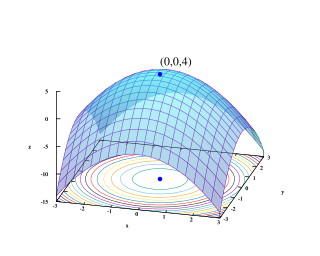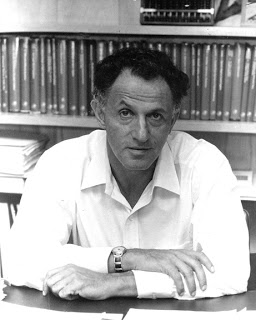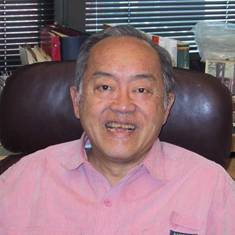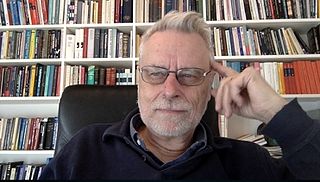Related Research Articles
The John von Neumann Theory Prize of the Institute for Operations Research and the Management Sciences (INFORMS) is awarded annually to an individual who has made fundamental and sustained contributions to theory in operations research and the management sciences.

Mathematical optimization or mathematical programming is the selection of a best element, with regard to some criterion, from some set of available alternatives. It is generally divided into two subfields: discrete optimization and continuous optimization. Optimization problems of sorts arise in all quantitative disciplines from computer science and engineering to operations research and economics, and the development of solution methods has been of interest in mathematics for centuries.

Richard Ernest Bellman was an American applied mathematician, who introduced dynamic programming in 1953, and made important contributions in other fields of mathematics, such as biomathematics. He founded the leading biomathematical journal Mathematical Biosciences.
Edward Grady "Ed" Coffman Jr. is a computer scientist. He began his career as a systems programmer at the System Development Corporation (SDC) during the period 1958–65. His PhD in engineering at UCLA in 1966 was followed by a series of positions at Princeton University (1966–69), The Pennsylvania State University (1970–76), Columbia University (1976–77), and the University of California, Santa Barbara (1977–79). In 1979, he joined the Mathematics Center at Bell Laboratories where he stayed until his retirement as a Distinguished Member of Technical Staff 20 years later. After a one-year stint at the New Jersey Institute of Technology, he returned to Columbia University in 2000 with appointments in Computer Science, Electrical Engineering, and Industrial Engineering and Operations Research. He retired from teaching in 2008 and is now a Professor Emeritus still engaged in research and professional activities.

Éva Tardos is a Hungarian mathematician and the Jacob Gould Schurman Professor of Computer Science at Cornell University.

Yu-Chi "Larry" Ho is a Chinese-American mathematician, control theorist, and a professor at the School of Engineering and Applied Sciences, Harvard University.

Dimitri Panteli Bertsekas is an applied mathematician, electrical engineer, and computer scientist, a McAfee Professor at the Department of Electrical Engineering and Computer Science in School of Engineering at the Massachusetts Institute of Technology (MIT), Cambridge, Massachusetts, and also a Fulton Professor of Computational Decision Making at Arizona State University, Tempe.
Roger Jean-Baptiste Robert Wets is a "pioneer" in stochastic programming and a leader in variational analysis who publishes as Roger J-B Wets. His research, expositions, graduate students, and his collaboration with R. Tyrrell Rockafellar have had a profound influence on optimization theory, computations, and applications. Since 2009, Wets has been a distinguished research professor at the mathematics department of the University of California, Davis.

Ralph Tyrrell Rockafellar is an American mathematician and one of the leading scholars in optimization theory and related fields of analysis and combinatorics. He is the author of four major books including the landmark text "Convex Analysis" (1970), which has been cited more than 27,000 times according to Google Scholar and remains the standard reference on the subject, and "Variational Analysis" for which the authors received the Frederick W. Lanchester Prize from the Institute for Operations Research and the Management Sciences (INFORMS).

Anders Gunnar Lindquist is a Swedish applied mathematician and control theorist. He has made contributions to the theory of partial realization, stochastic modeling, estimation and control, and moment problems in systems and control. In particular, he is known for the discovery of the fast filtering algorithms for (discrete-time) Kalman filtering in the early 1970s, and his seminal work on the separation principle of stochastic optimal control and, in collaborations with Giorgio Picci, the Geometric Theory for Stochastic Realization. Together with late Christopher I. Byrnes and Tryphon T. Georgiou, he is one of the founder of the so-called Byrnes-Georgiou-Lindquist school. They pioneered a new moment-based approach for the solution of control and estimation problems with complexity constraints.
Eldon Robert Hansen is an American mathematician and author who has published in global optimization theory and interval arithmetic.

Alan Stuart Edelman is an American mathematician and computer scientist. He is a professor of applied mathematics at the Massachusetts Institute of Technology (MIT) and a Principal Investigator at the MIT Computer Science and Artificial Intelligence Laboratory (CSAIL) where he leads a group in applied computing. In 2004 he founded a business, Interactive Supercomputing, which was later acquired by Microsoft. Edelman is a fellow of American Mathematical Society (AMS), Society for Industrial and Applied Mathematics (SIAM), Institute of Electrical and Electronics Engineers (IEEE), and Association for Computing Machinery (ACM), for his contributions in numerical linear algebra, computational science, parallel computing, and random matrix theory, and he is one of the cocreators of the technical programming language Julia.
Dorit S. Hochbaum is a professor of industrial engineering and operations research at the University of California, Berkeley. She is known for her work on approximation algorithms, particularly for facility location, covering and packing problems, and scheduling, and on flow and cut algorithms, Markov random fields, image segmentation and clustering.
Algebraic modeling languages like AIMMS, AMPL, GAMS, MPL and others have been developed to facilitate the description of a problem in mathematical terms and to link the abstract formulation with data-management systems on the one hand and appropriate algorithms for solution on the other. Robust algorithms and modeling language interfaces have been developed for a large variety of mathematical programming problems such as linear programs (LPs), nonlinear programs (NPs), Mixed Integer Programs (MIPs), mixed complementarity programs (MCPs) and others. Researchers are constantly updating the types of problems and algorithms that they wish to use to model in specific domain applications.

Bruce Edward Hajek is a Professor in the Coordinated Science Laboratory, the head of the Department of Electrical and Computer Engineering, and the Leonard C. and Mary Lou Hoeft Chair in Engineering at the University of Illinois at Urbana-Champaign. He does research in communication networking, auction theory, stochastic analysis, combinatorial optimization, machine learning, information theory, and bioinformatics.

Christine A. Shoemaker joined the Department of Industrial Systems Engineering & Management and the Department of Civil and Environmental Engineering as NUS Distinguished Professor on 31 August 2015. Prof Shoemaker obtained her Ph.D. in Mathematics from the University of Southern California supervised by Richard Bellman in Dynamic Programming. Upon her graduation, she joined the School of Civil and Environmental Engineering and later the School of Operations Research and Information Engineering at Cornell University, Ithaca, NY, USA. She was promoted to full Professor in 1985. From 1985 to 1988, Professor Shoemaker was the Chair of the Department of Environmental Engineering at Cornell University. In 2002 Prof. Shoemaker was appointed the Joseph P. Ripley Professor of Engineering at Cornell University, USA. In 2015, Prof. Shoemaker became Distinguished Professor at National University of Singapore, in both Industrial Systems Engineering and Management Department and Civil and Environmental Engineering Department. While in Singapore she has worked with Singapore water agency to apply her global optimization algorithms to improve the selection of parameters for computationally expensive partial differential equation models for lake hydrodynamics and complex multi-species water quality elements.These results used her group’s new parallel algorithms.
Jorge Nocedal is a applied mathematician, computer scientist and the Walter P. Murphy professor at Northwestern University who in 2017 received the John Von Neumann Theory Prize. He was elected a member of the National Academy of Engineering in 2020.
Zelda Barbara Zabinsky is an industrial engineer and operations researcher specializing in the application of global optimization to logistics. She is a professor of industrial engineering at the University of Washington, where she also holds adjunct positions in electrical engineering, mechanical engineering, and civil and environmental engineering.
Zhi-Quan (Tom) Luo is Vice President (Academic), Director of Shenzhen Research Institute of Big Data and Director of CUHK(SZ)-Tencent AI Lab Joint Laboratory on Machine Intelligence.

Werner Römisch is a German mathematician, professor emeritus at the Humboldt University of Berlin, most known for his pioneer work in the field of stochastic programming.
References
- ↑ Birth year from WorldCat identities, accessed 2022-04-02
- 1 2 "Sharon Arroyo calculates the future quotient with advanced math", Innovation Quarterly, Boeing, August 2018, retrieved 2022-04-02
- 1 2 3 4 5 6 Lanius, Melinda; Diaz-Lope, Alexander (January 2018), "Sharon Arroyo Interview" (PDF), The Graduate Student Section, Notices of the American Mathematical Society, 65 (1): 29–30, doi:10.1090/noti1627
- ↑ Sharon Arroyo at the Mathematics Genealogy Project
- ↑ Leadership, Society for Industrial and Applied Mathematics, retrieved 2022-03-31
- ↑ "SIAM Announces Class of 2022 Fellows", SIAM News, March 31, 2022, retrieved 2022-03-31
- ↑ "Advancement of Women in OR/MS", Awards, Institute for Operations Research and the Management Sciences, retrieved 2022-10-02